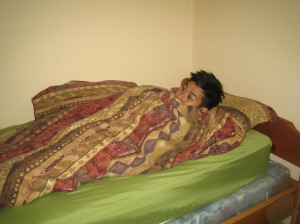Sweating is a normal physiological occurrence that helps keep the body cool. Whenever the body is exposed to a warm environment, the sweat glands in our body becomes active and produces sweats which aims to cool down the temperature of the body. Once the temperature of body becomes normal, the body will stop perspiring.
People sweat more in the daytime since they are active and also due to the daytime heat, but some individuals complain of cold sweats while they are sleeping. Cold sweats while sleeping is a condition known as sleep hyperhidrosis or night sweats.
Night sweats are harmless and not an issue to worry about. It is usually caused by excess warmth of the bedroom due to lack of proper ventilation, using extra bed sheets and blankets or having nightmares during sleep.
Symptoms of cold sweats or hyperhidrosis

- Sweaty hands and smelly shoes
- Difficulty in gripping objects such as pens
- A handshake that is cold and wet
- Can cause damage to keyboards and has difficulty dealing with paper and metals
- Constantly worry about changing of clothes
Causes of cold sweats while sleeping
- Cold sweats while sleeping can be caused by certain conditions such as tuberculosis, osteomyelitis which is infection and inflammation in the bone, hyperthyroidism and endocarditis which is a disease that affects the heart valves.
- Side effects of some medications such as antidepressants, antipyretics, anti-inflammatory and birth control pills.
- Taking large doses of insulin can cause sudden decrease of the blood sugar levels and results to excessive perspiration.
- Women in their 40’s and 50’s, those close to the menopausal stage are more likely to experience cold sweats at night.
Treatment and home remedies for cold sweats while sleeping
- If sweating is caused by hyperhidrosis, the individual should use an antiperspirant. In case the symptoms are severe, seek medical help immediately.
- Limit the amounts of blankets used since too many blankets can cause the body to retain extra amount of heat during night time and trigger sweating.
- Avoid putting extra layers of bedding to the bed since it can trap body heat and can cause sweating during the night.
- Sleep in a cool room with good ventilation or has air-conditioning.
- Wear sleeping clothes that are made of cotton which allows good air circulation
- Take a cold shower before going to bed.
- Drink cold milk before going to bed.
- Perform meditation before sleeping in order to keep the mind free from anxiety and stress which causes sweating.
- Avoid alcohol, spicy foods and cigarette smoking during night.
- Eat a variety of fruits and vegetables, milk and other dairy products since these can help cool the body.
- Avoid placing an allergy barrier or plastic mattress protectors for the bed. Use cotton sheets and avoid putting extra barriers or layers under them at night since they might stick to the skin while sleeping.
